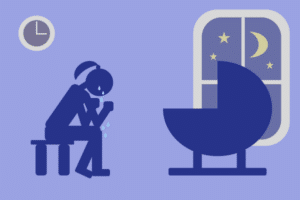Perri Shaw Borish, MSS, LCSW, BCD shares her thoughts on the baby blues.

It’s three days after you’ve had your precious baby and you’re finally home, where you spent countless hours as a pregnant woman fantasizing about what it would be like to be with your newborn. Maybe you imagined the lights dimmed as you looked lovingly into your baby’s eyes; or perhaps you imagined your sweet baby lying between you and your partner in your cozy bed. Whatever your fantasy was, reality has set in, and not only is your vision more of a distant memory, but you feel like an emotional wrecking ball. You’re crying and you don’t know why. Your baby is crying and you don’t know why. You can’t seem to make a decision, you’re exhausted and you have even wondered if maybe your baby deserves a better, more suited mother.
As a psychotherapist, I want you to know you are not alone. Many new mothers experience these types of anxious, depressed thoughts in the first few days or weeks after giving birth. These feelings are called the “baby blues.” In fact, 50 to 80 percent of women experience the baby blues, which come and go after childbirth and are usually gone within three weeks. As the American Academy of Family Physicians states, “The blues are considered a normal part of early motherhood.” Given the large number of women who experience the baby blues, it’s unbelievable that, at some point during the prenatal period, doctors and midwives don’t educate their patients on the possibility of experiencing these symptoms. One reason new mothers are often surprised by their feelings is because along with pregnancy come dreams and expectations of what life will be like with the newest member of the family. It can throw off the equilibrium of the first few weeks at home, and women find themselves having to readjust their expectations. The best way to combat the baby blues is by preparing for it, recognizing and talking about your feelings and asking for help when you need it.
So the question then becomes, how do you know if you have the baby blues or something more serious and long term?
The Baby Blues Symptoms: What to Expect
Women who experience the baby blues are at risk for developing Postpartum Depression. As such, it is important for new mothers and their partners to understand the symptoms, what to watch out for and when to consult an expert:
- The baby blues occur during the first three days after birth and can last up to three weeks. If it lasts longer, you may be experiencing Postpartum Depression and should consult your doctor or mental health provider.
- Usually the blues are hormone-related, and women with the baby blues are rarely a threat to themselves or their baby.
- The symptoms of baby blues are crying for no reason, impatience, irritability, restlessness and anxiety. The baby blues are often accompanied with mild depression.
The baby blues can be awful and hard to tolerate, especially given the simultaneous adjustment to motherhood. Fortunately, the baby blues are short-lived. This does not mean, however, that your feelings should be ignored or diminished in any way. Women experiencing these symptoms need care, attention and support. They need help with the baby and should be encouraged to accept it.
How Partners Can Help
So, to all the partners of these courageous women, I beseech you to pay very close attention to the mother of your baby at this critical time. Do not wait for her to ask you for help. She may be so overwhelmed that she may not be able to name exactly what it is she needs help with.
- Be available to your partner for comfort and reassurance and allow her the space to talk about how she is feeling.
- If you can’t be there for her, get help from family or friends during this crucial period.
- Do not expect your partner to be able to do all that she did prior to having a baby.
- Act as the gatekeeper and safeguard her from well-intentioned visitors so she is not overtaxed by the company.
- Encourage her to sleep when she can, as she is no doubt exhausted.
- Make sure she eats well and gets out of the house when possible.
Here’s the Good News: The baby blues are common and manageable with support and preparation. Whether you are a woman about to embark upon motherhood, or a first-time father, or a new grandparent, you can help prepare the family by setting systems in place to give the new mother and her baby extra support during the first few postpartum weeks. You are about to enter what will undoubtedly be the most rewarding and challenging event of your lives and the more you prepare for it, the more you will be able to enjoy the time with your newborn.
Join Our Weekly Support Group
Perri Shaw Borish runs a weekly support group out of Center City Pediatrics on Wednesday’s at 9:30 am. The group is open to everyone (regardless of the number of children you have) and is an authentic, safe space to come together for support and nurturing. Often what we most need after having a baby is mothering and nurturing. This group provides just that. But don’t take it from us. Here are some testimonials from mothers who have been in Perri’s groups in the past:
“I personally moved out of state, and would give anything to attend this group again. Especially now having my third child in 3 years.
This group was the best mommy group I’ve been to in Philly and I’ve been to many. This one was my favorite because it was purely for me. I always left feeling lighter, relieved, not alone, with a bit more peace. It was the only group that was truly a safe place to say it all: good, bad, ugly about marriage, motherhood, and personal struggles. The best part was everyone in the group was just as open an honest as I was. I miss this group dearly and can’t say enough wonderful things about it.”
-Mom of 3
“I highly recommend the Postpartum Group at Center City Peds. Whether you are experiencing mild negative feelings, Postpartum Depression (like I had), or are just in need of a little company during maternity leave, this is a perfect chance to meet other mothers in a safe and comfortable environment.”
– Carolyn
Additional Resources
For additional information on the baby blues see the below resources:
American Academy of Family Physicians
 33 Rock Hill Rd
33 Rock Hill Rd 1740 South Street
1740 South Street 2365 East York Street
2365 East York Street